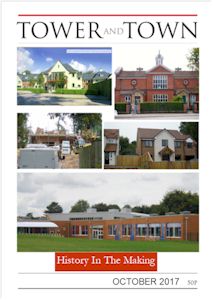

Tower and Town, October 2017 (view the full edition) (view the full edition)Restorative JusticeKaren is a Restorative Justice facilitator.
Two years ago I went to a talk by Jo Berry, the daughter of MP Sir Anthony Berry who was killed in 1984 by the Brighton bomber Pat Magee. She described her devastation at losing her father, and how, much later, she felt the desire to meet Pat to try and understand from him what drove him to murder. To cut her profoundly moving story short, she did meet him, and she witnessed the moment, while she was expressing her loss to him, when the realisation hit him that he had killed a loved and loving person, not a political symbol. She has continued to meet him, and the two of them give public presentations together on reconciliation. She would now describe him as a friend. She doesn't use the word ‘forgiveness’ but says she understands him (and that he hasn't forgiven himself).
Jo’s account is an example of Restorative Justice. RJ is a process that brings together the victim and perpetrator of a crime or conflict, in a controlled environment, in order to talk and try to repair the harm and enable both parties to move forward with their lives. For offenders, this can be very challenging as it confronts them with the human impact of their crime. For victims, meeting the person who has harmed them can be a huge step in recovering and moving forward.
In Wiltshire, RJ is funded by the Polic and Crime Commissioner, Angus MacPherson, as part of the service offered to victims, to empower them and give them a voice. It is a voluntary process, initiated almost always by the victim, supported throughout by trained facilitators who see both parties separately on several occasions to hear their experiences, prepare them for an RJ conference, and make sure it is safe. If there are concerns - e.g., the offender is not able to take reponsibility for his/her actions - then a conference would not take place. If the victim feels that a face-to-face meeting is not the best way forward, then the facilitators might arrange communication via letters, recorded interview or video. It is a moving and therapeutic process for most victims - there is an 85% satisfaction rate. It can be used for criminal offences such as dangerous driving, burglary, assault, or homicide, alongside any stage of the criminal justice system, but also for any sort of conflict at school, at work or with neighbours. To learn more or find out how you can take part in Restorative Justice, please follow the links below. http://www.wiltshire-pcc.gov.uk/Commissioning/Restorative-Justice.aspxhttps://www.youtube.com/watch?v=lErrbYzjdC8 https://www.youtube.com/watch?v=A1s6wKeGLQk Karen Smith |